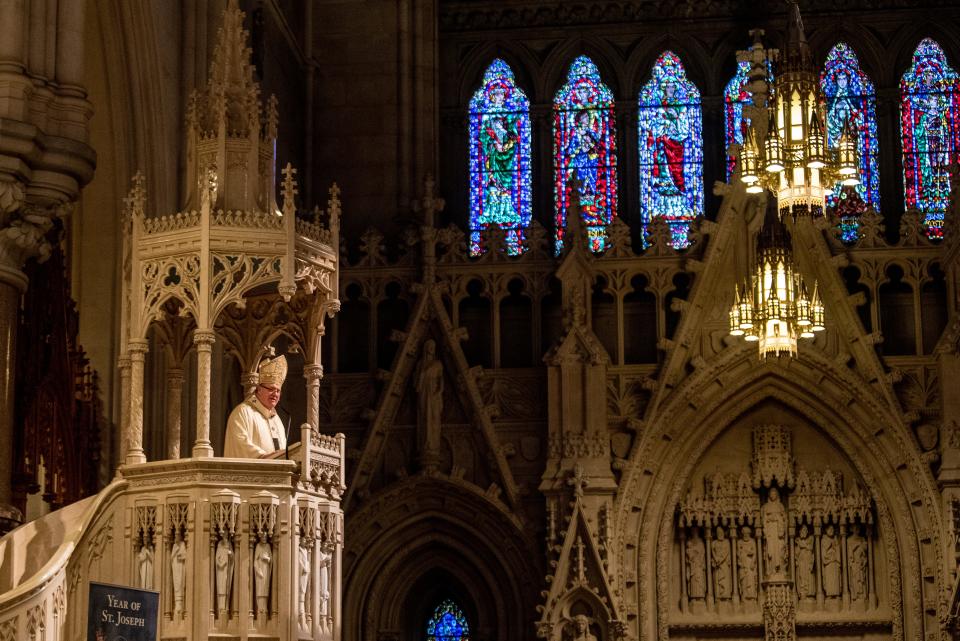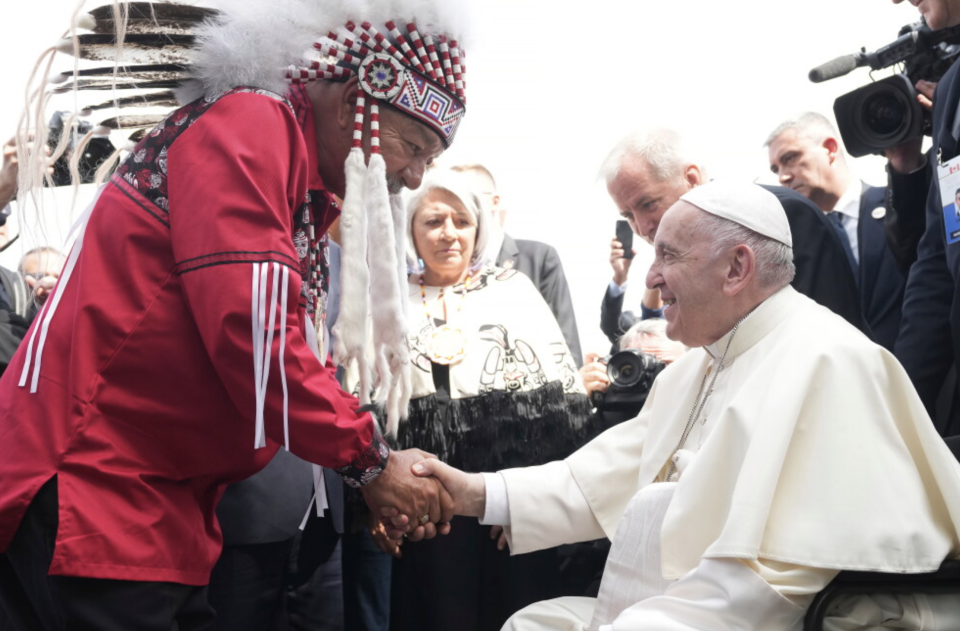Survey finds North Jersey Catholics back female priests, LGBTQ rights, more diversity
- Oops!Something went wrong.Please try again later.
- Oops!Something went wrong.Please try again later.
Reach out to the marginalized, ordain women, engage the youth.
Those were among the themes that emerged from a survey of North Jersey Catholics released last week by the Archdiocese of Newark, spiritual home to 1.3 million worshippers in Bergen, Essex, Hudson and Union counties.
In hundreds of in-person and online listening sessions this year, more than 15,000 local Catholics said the church needs to make fundamental reforms to become welcoming to women, LGBTQ parishioners, immigrants and the young people who have increasingly strayed from religious life.
"They believe that the Church is out of touch today," said a 39-page summary of the findings, released by the archdiocese.

Participants said some aspects of church doctrine are out of sync with modern times, particularly concerning divorce and the annulment of marriages, birth control, the LGBTQ community and the ordination of female priests.
"Many suggested that the catechism" − the fundamental rules of the Catholic faith − "be updated to reflect changes in doctrine and regulations that no longer apply in today's world," according to the archdiocese's report.
There was positive feedback as well from the 700 small-group discussions held throughout the archdiocese. People expressed gratitude for Catholic ministries that serve parishioners, such as those that offer Communion to the sick and homebound, as well as charitable efforts such as soup kitchens and food pantries.
How much or how quickly such sentiments lead to change in the two-millennia-old institution remains to be seen. But the local survey, part of a broader global effort by the Catholic church, "opened a way to think concretely about how to address issues on the local level," said Cardinal Joseph Tobin, the head of the Newark Archdiocese.
The archdiocese report mirrored findings last month from New Jersey's other four Catholic dioceses − Trenton, Camden, Paterson and Metuchen, which represent a combined 2.5 million Catholics and also found participants pushing for expanded roles for women and other groups.
Pope Francis leads global synod
The listening sessions were part of a process launched by Pope Francis last year in an effort take the pulse of Catholics worldwide. Similar initiatives have taken place for centuries among church leaders, but Francis asked every diocese on the planet to survey its parishioners, churchgoing or not. The results will guide participants in a "synod," or assembly, of bishops scheduled for Rome in October 2023.
Dioceses around the U.S. that have posted results online found a longing for a more inclusive church, more participation by women and the laity, and greater outreach to young people.
Historic pair: NJ father and son, ordained two weeks apart, make history at Catholic Mass
Inquiry closed: Bergen priest accused of sexual misconduct is reassigned to Newark with inquiry closed
North Jersey voices echoed many of those ideas.
Many in the Newark sessions said the church needs to do a better job of welcoming those who feel ignored, including LGBTQ Catholics, undocumented immigrants and those with disabilities, according to the report.
Hispanic Catholics expressed concerns about people who are "on the margins" of parish life, such as young people who don't see a place for themselves in church life, those who suffer from addiction, prisoners, the elderly and non-practicing Catholics. Some "don't feel welcome because they have lost their faith," according to the report.
Many said the Archdiocese "needs greater diversity in its leadership, including women, people of color and Hispanics," according to the summary.
Participants also "expressed appreciation to Pope Francis for the opportunity to dialogue, discern and be heard," Tobin said in a statement. "Whatever happens in Rome next year, we already have some valuable insights into our mission here."
Many of the young people who participated in the discussions said that the church doesn't accept them or listen to their concerns about social and mental health issues, the report added.
'Lack of respect' for women
"Participants in nearly every parish [of the Archdiocese] said that it is time for women to be ordained as deacons and priests," it said. "These ideas were very strongly accompanied by an underlying sense of frustration. Many believe that the fact that women are not ordained as deacons or priests shows severe inequality and a lack of respect for the dignity of women."

Among the suggestions made were to find ways to invite newcomers into local parishes, to reach out to those who feel marginalized and to create an environment where lay people feel they can "speak boldly" and share their concerns.
Dugan McGinley, a religion professor at Rutgers University, said he was pleased to see a call for welcoming people on the margins, including the LGBTQ community. "It says a lot that the report names this group," he said, "though it remains unclear how such welcome can really happen without correlated doctrinal changes."
A greater voice for the laity in church affairs may gain support, but major changes like blessing same-sex unions and the ordination of women are unlikely, he said. "Bishops from the global south are very resistant to change and they are becoming the more predominant voices because that's where most Catholics live now.""Much will depend on how much future popes allow dialogue, as Francis is currently encouraging."
The Archdiocese will meet with diocesan offices and parishes to review the findings, said Sister Donna Ciangio, the chancellor of the Newark Archdiocese. "The Synod opened a whole new way of thinking for people and for parish leadership," she said. "The whole idea is that we need to listen to and talk with people. By listening to their ideas, we're helping them understand that this is everyone's parish."
Through the process, she said, "the Archdiocese has learned how we can better serve people. We heard what they need, which will influence how we collaborate on programs and resources moving forward."
Deena Yellin covers religion for NorthJersey.com. For unlimited access to her work covering how the spiritual intersects with our daily lives, please subscribe or activate your digital account today.
Email: yellin@northjersey.com
Twitter: @deenayellin
This article originally appeared on NorthJersey.com: Newark Archdiocese survey: NJ Catholics want more inclusivity

